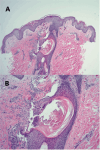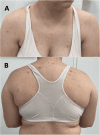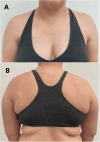Recalcitrant Pustular Dermatosis Successfully Treated With Prolonged Isotretinoin Therapy
- PMID: 39726499
- PMCID: PMC11671108
- DOI: 10.7759/cureus.74501
Recalcitrant Pustular Dermatosis Successfully Treated With Prolonged Isotretinoin Therapy
Abstract
Isotretinoin (13-cis-retinoic acid) is a well-established systemic treatment for moderate to severe acne vulgaris, renowned for its ability to target multiple contributors to acne pathogenesis. However, its therapeutic potential extends beyond conventional acne management. This case report highlights its efficacy in treating recalcitrant pustular dermatosis, a condition that proved resistant to standard therapies and posed significant diagnostic challenges. A 25-year-old female patient presented with a diffuse, inflamed pustular rash that was unresponsive to a wide range of conventional treatments, including antibiotics, antifungals, and topical agents. Initially diagnosed as bacterial folliculitis based on clinical appearance, the condition persisted despite these interventions. Multiple punch biopsies and laboratory tests aimed at ruling out other conditions, such as pityriasis folliculorum, eosinophilic folliculitis, and cutaneous mastocytosis, provided inconclusive results. Without a definitive diagnosis and after exhausting standard treatments, the decision to initiate systemic isotretinoin was driven by its unique mechanism of action as a "sebocyte modulator," which targets sebum production, inflammation, and abnormal keratinization-key factors suspected to underlie the patient's condition. Over several months, gradual but consistent improvement was observed, culminating in the complete resolution of pustular lesions. The patient's successful response to isotretinoin highlights the importance of considering this treatment in refractory pustular dermatosis when conventional therapies fail, advocating for its broader clinical application in managing complex pustular skin disorders.
Keywords: dermatoses; isotretinoin; long-term management; pustular dermatosis; pustular rash; systemic retinoids.
Copyright © 2024, Aoki et al.
Conflict of interest statement
Human subjects: Consent for treatment and open access publication was obtained or waived by all participants in this study. Conflicts of interest: In compliance with the ICMJE uniform disclosure form, all authors declare the following: Payment/services info: All authors have declared that no financial support was received from any organization for the submitted work. Financial relationships: All authors have declared that they have no financial relationships at present or within the previous three years with any organizations that might have an interest in the submitted work. Other relationships: All authors have declared that there are no other relationships or activities that could appear to have influenced the submitted work.
Figures





References
-
- The use of oral vitamin A in acne management: a review. Cook MK, Perche PO, Feldman SR. Dermatol Online J. 2022;28 - PubMed
-
- Isotretinoin: mechanism of action and patient selection. Webster GF. Semin Cutan Med Surg. 2015;34:0–8. - PubMed
-
- Update on the aetiology and mechanisms of generalized pustular psoriasis. Wang H, Jin H. Eur J Dermatol. 2021;31:602–608. - PubMed
Publication types
LinkOut - more resources
Full Text Sources
